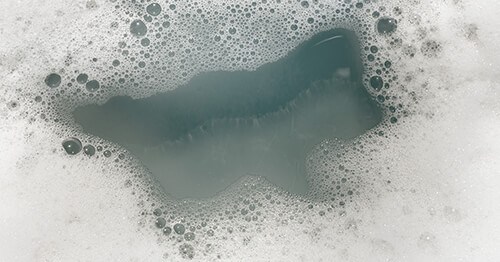Recommended Reasons Behind Effluent Backflow in the Bathtub
Recommended Reasons Behind Effluent Backflow in the Bathtub
Blog Article
This article listed below on the subject of Why is Sewage Backing Up Into My Bathtub? is totally entertaining. You should look it over.

Sewer back-up in the tub can be a traumatic and unhygienic trouble for any homeowner. Not just is it troublesome, however it also positions severe health threats and shows underlying concerns with the plumbing system. Comprehending why sewer is showing up through the bath tub is critical for taking ideal action to deal with the problem properly.
Introduction to the Issue
Comprehending the Trouble
When sewer draws back up right into the bathtub, it's a clear indication of a trouble with the drainage system. The wastewater that ought to be moving far from your home is rather locating its way back into your home, which can lead to significant damage and carcinogen.
Potential Reasons
A number of aspects can contribute to sewage back-up in the bath tub. From clogs in the sewer line to issues with the plumbing facilities, recognizing the source is essential for discovering a solution.
Usual Reasons for Sewage Back-up
Blockages in the Sewer Line
Among the most typical root causes of sewage back-up is a blockage in the drain line. This can occur because of the buildup of debris, oil, or international items in the pipes, stopping correct flow and triggering sewage to back up right into your tub.
Tree Origin Breach
Tree origins looking for wetness and nutrients can infiltrate drain lines with small fractures or joints. Gradually, these roots can expand and broaden, triggering substantial damages to the pipelines and resulting in sewer back-up issues.
Aging Infrastructure
Older homes may have outdated plumbing systems that are much more susceptible to deterioration, splits, and deterioration. As pipelines age, they become extra susceptible to leakages and clogs, boosting the possibility of sewage backup cases.
Heavy Rainfall or Flooding
Throughout periods of heavy rainfall or flooding, the drain system may become overloaded with excess water, triggering back-ups and overflows. This can result in sewer backing up right into tubs and other fixtures inside the home.
Health Risks Connected With Sewer Backup
Contamination of Water Supply
Sewage back-up can infect the supply of water in your house, positioning a serious health danger to you and your household. Exposure to polluted water can lead to stomach problems, skin infections, and various other diseases.
Spread of Condition
Sewer includes unsafe bacteria, infections, and bloodsuckers that can create a range of conditions, consisting of hepatitis, cholera, and gastroenteritis. Entering into contact with sewage or polluted surfaces puts you at risk of infection.
Mold Growth
Moisture from sewer backup can create suitable conditions for mold and mildew development in your home. Mold spores can aggravate respiratory system problems and create allergies in sensitive individuals, making prompt clean-up vital.
Indicators of Sewer Backup
Foul Odors
Undesirable smells originating from drains pipes or fixtures, especially in the restroom, might suggest sewer backup concerns. These smells are typically strong and persistent, signifying a problem that calls for immediate interest.
Slow Draining Fixtures
Bath tubs, sinks, and commodes that drain slowly or not whatsoever could be experiencing sewage backup. If numerous components are affected all at once, it's likely that the problem originates from a common factor, such as the major drain line.
Gurgling Sounds
Weird gurgling or bubbling sounds coming from drains pipes when water is running somewhere else in the house are a sign of air entraped in the plumbing system. This air buildup can arise from sewage back-up and should be investigated immediately.
Immediate Actions to Take
Turning Off Supply Of Water
In the event of sewer back-up, it's vital to switch off the supply of water to stop further contamination and damages. Find the primary water shutoff valve in your house and closed it off up until the problem can be dealt with.
Speaking To an Expert Plumber
Taking care of sewer back-up is not a DIY job. Contact a qualified plumber with experience in managing sewage-related concerns to examine the circumstance and carry out needed fixings or cleanings.
Preventing Contact with Contaminated Water
Until the sewage back-up is settled, stay clear of contact with infected water to avoid the spread of bacteria and microorganisms. Wear safety equipment if you should remain in the afflicted location and wash your hands extensively later.
Preventive Measures
Routine Maintenance of Sewer Lines
Schedule regular assessments and maintenance of your sewage system lines to recognize and attend to prospective concerns before they rise into major troubles. This can consist of clearing out particles, checking for tree root intrusion, and repairing any kind of damaged pipes.
Setting Up Bayou Valves
Think about installing bayou shutoffs in your plumbing system to stop sewer from receding right into your home throughout durations of heavy rainfall or flooding. These shutoffs immediately close when water starts backing up, protecting your residential or commercial property from contamination.
Proper Disposal of House Waste
Stay clear of flushing anything apart from toilet paper and human waste down the toilet to avoid clogs and blockages in the sewage system line. Dispose of oil, oil, and other home chemicals appropriately to lessen the danger of plumbing issues.
Cleaning Up After Sewer Backup
Sanitation Procedures
Completely sanitize and sterilize affected areas after sewer backup to eliminate damaging bacteria and stop mold and mildew growth. Use suitable cleansing products and protective equipment to make certain safe and efficient cleanup.
Restoration of Affected Locations
Fix any damage to floor covering, walls, or components brought on by sewer back-up. Depending on the extent of the damage, you may need to change carpeting, drywall, or other materials to recover your home to its pre-loss condition.
Why Is Water Backing Up in My Bathtub When I Flush My Toilet?
What to do about a sewer line clog
First, don’t bother with plunging. No amount of plunging will dislodge the clog in a sewer line. The clog is too far away. Plungers are for clogs in the toilet itself, not the sewer line. Plus, the most likely causes of a sewer clog are:
Tree roots Flushed toys or feminine products Grease buildup Those items don’t move easily. And in the case of tree roots, the roots need to be cut out of the pipe and the pipe will need to be repaired.
You’ll need a closet auger. A closet auger is a type of plumber’s snake with a protective cover to keep from scratching the delicate porcelain toilet. If the clog is further down, you may need to remove the toilet or use one of your cleanouts to get to the clog.
We also recommend doing a video inspection of the drain to ensure that the cause of the clog has been completely removed. Otherwise, you could have the same problem again in a few days or weeks.
https://mspplumbingheatingair.com/blog/why-is-water-backing-up-in-my-bathtub-when-i-flush-my-toilet

Do you really like more info about Why is Sewage Backing Up Into My Bathtub?? Try to leave a short review down below. We will be pleased to know your ideas about this blog post. In hopes to see you back again in the near future. Are you aware of someone else who is in the market for the niche? Be sure promote it. Thank you for taking the time to read it.
Book Service
Report this page